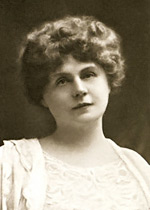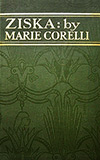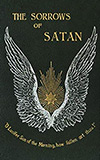Marie Corelli
| Full Name: | Marie Corelli |
| Born: | May 1, 1855 London, England |
| Died: | April 21, 1924 Stratford upon Avon, Warwickshire, England |
| Occupation: | Novelist, Mystic |
| Nationality: | British |
| Links: |
|
Biography
Mary Mackay was born in London to Elizabeth Mills, a servant of the Scottish poet and songwriter Dr Charles Mackay, her biological father. In 1866, eleven-year-old Mary was sent to a Parisian convent to further her education. She returned to Britain four years later in 1870.
Mackay began her career as a musician, giving piano recitals and adopting the name Marie Corelli for her billing. Eventually she turned to writing and published her first novel, A Romance of Two Worlds, in 1886. In her time, she was the most widely read author of fiction. Her works were collected by Winston Churchill, Randolph Churchill, and members of the British Royal Family, among others.
She faced criticism from the literary elite for her overly melodramatic writing. In The Spectator, Grant Allen called her "a woman of deplorable talent who imagined that she was a genius, and was accepted as a genius by a public to whose commonplace sentimentalities and prejudices she gave a glamorous setting." James Agate represented her as combining "the imagination of a Poe with the style of an Ouida and the mentality of a nursemaid."
A recurring theme in Corelli's books is her attempt to reconcile Christianity with reincarnation, astral projection, and other mystical ideas. She was associated at some point with the Fraternitas Rosae Crucis; a Rosicrucian and mystical organization, and her books were a part of the foundation of today's corpus of esoteric philosophy.
Corelli famously had little time for the press. In 1902 she wrote to the editor of The Gentlewoman to complain that her name had been left out of a list of the guests in the Royal Enclosure at the Braemar Highland Gathering, saying she suspected this had been done intentionally. The editor replied that her name had indeed been left out intentionally, because of her own stated contempt for the press and for the snobbery of those wishing to appear in "news puffs" of society events. Both letters were published in full in the next issue.
The writer also gained some fame after her letter to New York World magazine was published. Corelli claimed that she had warned George Herbert, 5th Earl of Carnarvon (one of the finders of the tomb of Tutankhamun) about the "dire punishment" likely to occur to those who rifle Egyptian tombs, claiming to cite an ancient book that indicated that poisons had been left after burials.
Works in the WWEnd Database
Non Series Works |
|||||||||||||||||||
|
|
|
|
|
|||||||||||||||



















 Full Details
Full Details









